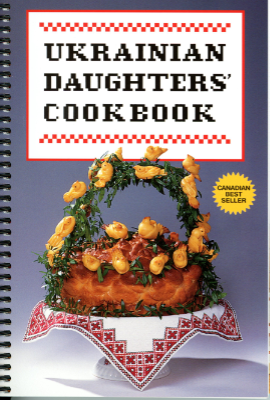Home / Shop
Ukrainian Daughter's Cookbook


- Description
Dedication
The Ukrainian Women's Association of Canada, Daughters of Ukraine Branch in Regina, humbly dedicate this cookbook to our mothers.
These pioneer women cared enough to instill in us the importance of preserving our Ukrainian culture and traditions.
May this cookbook be a precious resource for us and for future generations.
We wish to thank all the ladies of the Ukrainian Orthodox Cathedral who shared their favorite recipes so generously. Many of the recipes are synonymous with Ukrainians and Ukrainian cooking. We hope you enjoy our cross-stitch designs and Ukrainian pysanky.
Ukrainian Women's Association of Canada
Daughters of Ukraine Branch
Regina, Saskatchewan
Table of Contents
Christmas Eve Supper Easter Dishes Traditional Foods Breads, Crepes & Muffins Salads, Soups and Vegetables Fish Meat and Casseroles Desserts and Pastries | 7 23 45 59 77 97 105 115 |
Traditional Ukrainian Christmas Eve Supper (Sviata Vechera)
Twelve different and special dishes are traditional for this meal which begins only after the first star of the evening appears. The twelve dishes are to remind us of the twelve Apostles.
After a day of fasting, in remembrance of the hardships that Mary endured as she and Joseph travelled to Bethlehem, preparations of a spiritual and physical nature set the mood for this Holy Night.
Food for the Holy Supper is prepared with no meat or dairy products. Hay is put under the table and under the tablecloth as a reminder of the humble place of Christ's birth. On top of a white or embroidered tablecloth is placed a Kolach, in the middle of the table. In the middle of the Kolach, a candle is placed which is left burning all night. A lit candle is also placed in the window, to welcome any homeless people. There is always an extra table setting for the souls of the deceased. As dusk approaches, the head of the house brings in a Didukh, a sheaf of grain, and places it near the Icons. As the star appears, the father carries a bowl of Kutia around the home three times, reciting prayers. When all the family is at the table, prayers are recited and the Nativity Tropar is sung, "Bah Predvichny".
The first dish of the twelve is always Kutia, the eldest of the family throws a spoonful of the kutia to the ceiling. The more kernels that stick to the ceiling, the greater the good luck in the following year.
After the completion of the twelve dishes, nuts and candies are scattered in the hay under the table for the children to find. Throughout the rest of the evening, Christmas carols are sung by the family.
When it is almost midnight, all the members of the family go to the Nativity Mass, a celebration of Christ's birth. The traditional greeting is "Khrystos Razdayetsia" (Christ is Born) to which one replies, "Slavite Yoho" (Let us glorify him).
The following day and up to Yordan (Jordan) carollers visit families and friends, starting with the home of the priest, proclaiming the birth of Christ, our Saviour.
The Holy days of the Christmas season end on January 20th "The Feast of St. John the Baptist".
From: Ukrainian Daughters' Cookbook, page 8
Traditional Ukrainian Christmas Eve Dishes
- Kutia (wheat)
- Kolach
- Meatless borsch (beet soup)
- Stuffed salmon or fried fillets
- Pickled herring
- Verenyky (potatoes, sauerkraut or prunes)
- Sauerkraut and peas
- Broad beans or mashed beans
- Pidpenky (mushrooms) with gravy
- Compote
- Pompushky, makiwnyk
Ukrainian Easter
Easter, the most glorious and radiant event in all history, commemorates the resurrection of Christ.
With the ringing of the church bells at midnight on Saturday, the joyful Easter Matins begin. The triumphant resurrection service begins with a procession around the church. Temporarily, the darkened church is emptied and the doors are closed, representing the closed tomb of Christ. The procession circles the church three times, symbolizing the journey of the myrrhbearing women to the tomb of Christ in the early hours of the morning to anoint his body.
The visit to the empty sepulchre by the women is climaxed when the risen Saviour is seen and recognized. Here the priest greets the worshippers with the traditional words, "Christ is Risen". The people respond with "He is indeed Risen". The church bells peal, the worshippers re-enter the church and the Easter service proceeds to its joyful completion. The royal gates are kept open the entire Easter week to symbolize that the gates of Heaven have been opened to all faithful believers.
It is the custom to exchange or give Easter eggs (Pysanky) with the Easter greeting, "Krystos Voskres" to which the reply is "Voistyno Voskres".
Immediately after the service, people return home to break the long fast with an Easter breakfast of consecrated or blessed food. The menu consists of boiled eggs, a variety of hot and cold meats, roast suckling pig, cheese, salads, horseradish and beet relish, and delectable Easter breads and pastries. The meal begins with Easter grace, followed by a ceremonious serving of the blessed egg, which the elder head of the family divides into portions, one for each person, again with the greeting of Easter. This ritual symbolizes family unity and expresses hope for a happy and prosperous year until next Easter.
From: Ukrainian Daughters' Cookbook, page 24
Traditional Foods for the Blessing of Easter Baskets
- Hard-boiled eggs
- Meat products (ham, roast pork, lamb)
- Sausage (kowbasa)
- Butter
- Chees or egg-cheese
- Fresh horseradish root
- Salt
- Paska, babka
- Pysanky
The Easter Dinner would include all of the above blessed foods, plus a selection of the following:
- Holubtsi (cabbage rolls)
- Mashed potatoes and gravy
- Pyrohy
- Vegetables
- Salads
- Studemetz
- Tortes or cheesecakes
- Beverages

